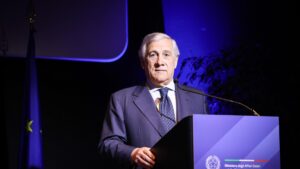Chinese-language media groups in Australia actively self-censor over fears staff, and family members could face reprisals from Beijing.
“Our staff members in China and Australia come from mainland China; their families are all in China,” one media proprietor told the Sydney-based Lowy Institute. “This is despite the fact that some of them obtain Australian citizenships or permanent residencies here.”
“Politically sensitive topics or criticisms against the Chinese government would put our staff members or their families at risk. We don’t want them or their families to get detained in China.”
The “Translating Tension: Chinese-Language Media in Australia” report examined over 500 news stories and interviewed executives at three large Chinese media groups, the Daily Chinese Herald, Media Today, and the Australian Chinese Daily.
Much of the news content was found to be translated from English-language media, with translators based in Australia, as well as China, Hong Kong, and Taiwan.
“Self-censorship extends beyond the individual discretion of media executives fearful for their safety and that of their families. It has become integral to media organisations’ risk management processes,” the report found.
For the Daily Chinese Herald and Media Today group, much of their content was distributed to mainland China via news apps, websites, and Chinese social media app WeChat.
Critiques of the Chinese Communist Party (CCP) were moderated and tempered over fears it could attract “disciplinary action” such as the removal of content, suspension of websites or WeChat accounts, or the complete blockage of their website and app in China.
“Reprisals such as these inflict significant financial damage,” the report added.
While the interviewees admitted that self-censorship was taking place, they stressed that it did not mean political alignment with the CCP.
“I think we need to recognise Chinese people, China as a country, Chinese culture, and the political party. We like the people, and we are part of the culture. But we do not necessarily agree with any political actions or ideologies,” one interviewee said.
Currently, there are over 1.2 million ethnic Chinese living in Australia, comprising around four percent of the total population, according to the 2016 Census.
Concerns have lingered, however, over the influence Beijing has over locally-based Chinese media groups.
In August 2020, then-Acting Immigration Minister Alan Tudge warned that “malign information or propaganda” could be spread through ethnic media outlets “controlled or funded” by state players.
A subsequent report from December 2020 revealed that around half of Australia’s 24 largest Chinese-language media outlets had links to Beijing.
Executives from 12 outlets had been members of organisations controlled by the United Front Work Department, Beijing’s foremost overseas infiltration organ. At the same time, four outlets were directly owned or received financial support from the CCP.
One example, which was also featured in the Lowy Institute report, was the Media Today group, whose Sydney-focused platform, Sydney Today, had around 670,000 followers in 2019.
The co-founder of Media Today, Stan Chen, was previously listed as vice-president of the Australian Council for the Promotion of Peaceful Reunification of China (ACPPRC) until 2018.
The ACPPRC’s former president Huang Xiangmo has made regular headlines in recent years over political donation scandals and the downfall of former Senator Sam Dastyari. The ACPPRC is also connected to a body controlled by the United Front.
Media Today has actively censored and removed its news content, particularly around foreign interference investigations by Australian security agencies, and Falun Gong, the meditation practice persecuted by the CCP.





